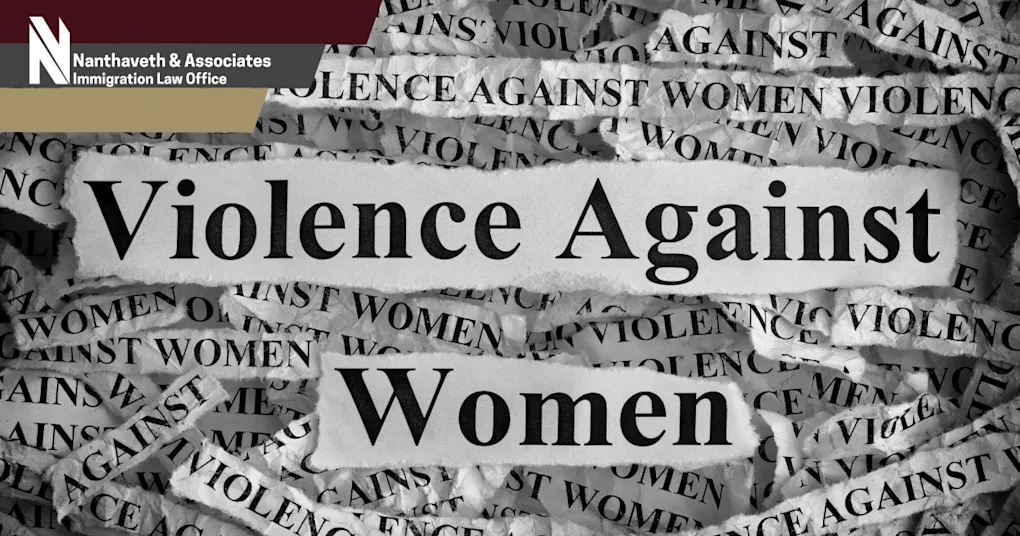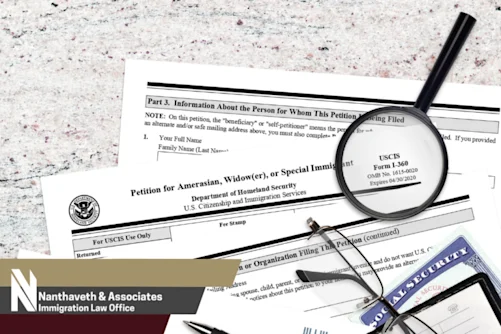Green Cards for VAWA Self-Petitioners
The federal Violence Against Women Act, or VAWA, makes some people eligible to become lawful permanent residents of the United States without their spouse’s or parent’s consent. However, the provision in this law doesn't apply to everyone. This guide explains how VAWA self-petitioners can apply for green cards on their own.

What is VAWA, and How Does it Relate to Immigration?
Normally, when a person wants to get a green card based on their family connections, they need a sponsor. A sponsor is someone who's willing to take responsibility (primarily financial) for the recipient.
However, victims of abuse who are married to a U.S. citizen or lawful permanent resident can apply for their own green cards without a sponsor.
What is a VAWA Self-Petitioner?
A VAWA self-petitioner Is a person who is eligible to apply for their own green card without a sponsor's consent. First, the person must apply to petition for themselves; then, they can apply to become a lawful permanent resident.
Do You Need a Sponsor if You’re a VAWA Self-Petitioner?
You do not need a sponsor if you are a VAWA self-petitioner. You may apply on your own.
Who’s Eligible to Self-Petition for a Green Card Under VAWA?
You may apply for a green card on your own if you are the victim of battery or extreme cruelty that was committed by your:
- United States citizen spouse or former spouse
- U.S. citizen parent
- U.S. citizen son or daughter
- Lawful permanent resident (LPR) spouse or former spouse
- LPR parent
It's important to note that despite the act’s name, you do not have to be a woman to apply for your own green card under this program. Anyone who has suffered battery or extreme cruelty committed by a citizen or lawful permanent resident in one of the above-listed relationships may apply.
However, even if a person is qualified based on battery or extreme cruelty through one of these family relationships that provide eligibility for a green card, not everyone is eligible to adjust their status as a VAWA self-petitioner. In fact, you must also meet these requirements:
- You must be physically present in the United States at the time you file your application to register your permanent residence or adjust status.
- You must be eligible to receive an immigrant visa.
- There must be an immigrant visa immediately available to you at the time you file your paperwork, as well as at the time that U.S. Citizenship and Immigration Services makes its decision.
- You are not barred from adjusting your status.
- You are considered admissible to the United States as a lawful permanent resident, or you're eligible for a waiver of inadmissibility (or another form of relief).
- You merit the favorable exercise of USCIS discretion.
What is the Favorable Exercise of USCIS Discretion?
USCIS officials our allowed to use their own discretion when determining whether an application is worthy of favorable consideration.
Essentially, that means if the official handling your case feels like it's worth pushing forward, it will be pushed forward.
What About Bars to Adjustment and Grounds of Inadmissibility?
VAWA self-petitioners are exempt from bars to adjustment. That means it doesn't matter how you entered the United States, or whether you committed one of a number of acts or violations of immigration law.
However, you must still be admissible to the United States. There are certain circumstances that make a person inadmissible, such as criminal records. As a VAWA self-petitioner, all of the grounds of inadmissibility apply to you (except those related to entry without inspection, which means coming into the United States unlawfully, and those related to becoming a public charge; a public charge is someone who is dependent on certain government benefits).
Is Self-Petitioning Confidential, or Will Your Spouse Find Out?
Applying for a green card as a VAWA self-petitioner is confidential. In fact, USCIS cannot disclose any information about you to third parties (except in very limited circumstances, and those are unlikely to apply to your abuser). Additionally, USCIS is not allowed to deny your application based on information provided solely by your abuser (or any other prohibited sources). Finally, if you apply for adjustment of status as a VAWA self-petitioner, USCIS won't accept requests for change of address under your name that don't come from you; that helps minimize the chances that your abuser will ever find out that you are petitioning.
What if Your Abuser Already Filed a Petition on Your Behalf?
You can transfer the priority date from the previously filed petition to your new petition. Your attorney can give you more specific guidance, but this is important because it can shorten your wait time to receive a green card.
Can Your Family Members Get Green Cards if You’re a VAWA Self-Petitioner?
Unmarried children who are under the age of 21 may also be eligible to apply for green cards as derivative family members of VAWA self-petitioners. If you are interested in applying for your own green card through this program and you have children under the age of 21, you should talk to an immigration attorney about your options.
Do VAWA Self-Petitioners Need Employment Authorization or Advance Parole?
If you have a pending adjustment of status petition, you may apply for employment authorization. If the U.S. government approves your employment authorization, you'll be able to get a job while you wait for your petition to go through.
VAWA self-petitioners are also allowed to apply for advance parole documents. These documents authorize you to appear at a port of entry to seek parole into the United States after you travel abroad temporarily. You only need one of these documents if you intend to leave the United States for a short period while your adjustment of status petition is pending. Otherwise, you don't need one.
One important thing to note is that if you do leave the United States temporarily without an advance parole document, USCIS considers you to have abandoned your application – so it's imperative that you get an advance parole document if you are leaving for any reason.
How Do You Petition for Your Own Green Card?
For most people, the easiest way to apply for their own green card under this program is to work with a skilled and knowledgeable immigration attorney. Your attorney can help you determine which forms to file and what types of evidence you need, as well as answer your questions along the way.
You’ll need, at minimum:
- Form I-485, Application to Register Permanent Residence or Adjust Status
- A copy of your approval notice or receipt of filing for Form I-360
- Two passport-style photos
- A copy of your government-issued ID (with a photograph)
- A copy of your birth certificate
- Form I-693, Report of Medical Examination and Vaccination Record
- A copy of your passport page with a nonimmigrant visa (if applicable), as well as a copy of the page with your admission or parole stamp (if applicable)
- A copy of Form I-94, Arrival/Departure Record
You may also need other documentation, but generally, it applies to specific circumstances. Your attorney can give you the guidance you need on providing documentation.
Do You Need to Talk to an Attorney About Becoming a VAWA Self-Petitioner for a Green Card?
If you are considering becoming a VAWA self-petitioner so you can apply for your own green card, we may be able to help you. Call our office today to schedule your consultation with a caring and compassionate immigration attorney who understands where you're coming from.

11211 Taylor Draper Lane Suite 107
Austin, TX 78759
Tel: (512) 828-3791
Hours: 8:00 AM - 6:00 PM
Payment: all major credit cards, cash, check, money orders, cashiers check
Directions To Our Office
Areas Of Service
Copyright © 2025 | Nanthaveth & Associates | Immigration Law Firm Marketing Specialist MarketCrest
Not all consultations are free, and they are not all conducted by Vi Nanthaveth.

